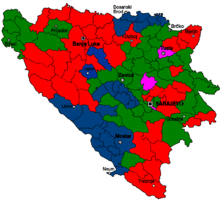- Bosnia and Herzegovina municipal elections, 1990
-
The municipal elections of Bosnia and Herzegovina in 1990 were won by several parties. In most municipalities they organized governments in coalitions, or independently if they had a large majority.
In most municipalities with either a relative or absolute Croatian majority, Croatian Democratic Union of Bosnia and Herzegovina (HDZ) won a majority of the vote and the right to choose the mayor. Only in Vareš -- a municipality with a relative Croatian majority -- did HDZ not win a majority of votes. HDZ also won elections in Bugojno, Fojnica and Mostar (a Bosniak relative majority) and Modriča and Derventa (a Serbian relative majority).
Nationally, Fikret Abdić gained the most votes to become President. He never assumed the presidency however, leaving it to Alija Izetbegović.
 Results of the 1990 elections in Bosnian municipalities. Red are municipalities in which SDS won most votes, green for SDA, blue for HDZ and pink are those where none of the nationalistic parties achieved the right to choose a mayor. This map could have errors and results for all the areas are not yet validated.
Results of the 1990 elections in Bosnian municipalities. Red are municipalities in which SDS won most votes, green for SDA, blue for HDZ and pink are those where none of the nationalistic parties achieved the right to choose a mayor. This map could have errors and results for all the areas are not yet validated.
Results by municipality:
Municipality Result Konjic Of the 60 members of the Assembly, 28 were from the SDA, 14 from the HDZ and 9 from the SDS, and there were also representatives from other smaller parties. Vitez 23 HDZ, 16 SDA, 9 SDP, 16 reformists, 2 SDS, 2 Youth Alliance, 1 Socialist Busovača At that time the Busovaca parliament had 60 10 representatives. The HDZ, SDA, SDS coalition received 64 per cent of the vote. Out of its part in 64%, the HDZ got 20 representatives. Bugojno The municipal council elected in 1990 included 21 delegates of the HDZ, 20 of the SDA, and 9 of the Serbian Democratic Party. Novi Travnik The HDZ had 20 seats in the municipal 7 assembly, the SDA won 17 seats, the SDP won 10 seats, 8 the Reformists won seven seats, and the SDS won six 9 seats in the municipal assembly. Mostar SDA won only 19 out of 100 seats in Mostar Ljubuški HDZ won 90% of seats, SDA 5% Čapljina HDZ won 52% of seats, SDA 20%, SDS 11% Kiseljak HDZ won 45% of seats, SDA 40% Odžak HDZ won 56% of seats and SDA, SDS, and SkBiH-SDP each won 12% Foča SDA won 45% of seats and SDS 44% Trebinje SDS won 62% of seats and SDA 13% Ugljevik SDS won 51% of seats, SDA 27% and SkBiH-SDP 11% Modriča HDZ won 26% of seats, SkBiH-SDP also 26%, SDS 22% and SDA 12% Maglaj SDA won 34% of seats, HDZ 21%, SDS had one seat less than HDZ, and SkBiH-SDP and SRSJ each only 14% of seats Goražde SDA won 58% of seats, SDS 26% Gradačac SDA won 37% of seats, SDS 18%, SkBiH-SDP had one seat less than SDS, and HDZ won 15% of seats Sarajevo-Novi grad SDA won 35% of seats, SDS 21%, SkBih-SDP 16% and reformists won only 15% Sarajevo-Centar SDA won 30% of seats, SkBih-SDP 21%, reformists 20%, SDS 15%; there were 100 seats in summation. Sarajevo-Stari grad SDA won 53% of seats, SkBiH-SDP 14%, reformists(SRSJ) 11% Prijedor SDA won 30 seats, the SDS 28, the HDZ 2, and 30 seats went to other parties: the so-called opposition parties, namely the Social Democratic, the Liberal Alliance, and the Reformist parties. Bosanski Šamac HDZ won 21 seats, SDS 17, SkBih-SDP 6, SRS 3, SDA 2, Liberals 1. Prnjavor Assembly had 60 seats. SDS won 42 seats, SDP won 11, SDA won 5. Gornji Vakuf-Uskoplje SDA won the elections and the ratio SDA: HDZ was about 50:45 (major was Muslim Muhamed Palalic and president of municipal government was Croat Zdravko Batincic) Čelinac SDS won about 85% of the votes, all other parties divided the rest Banja Luka SDS won 41% of votes, SDA and HDZ combined for 33%, and the rest (26%) was divided by smaller parties Zenica SDA and HDZ won 67% (most of it was to SDA), SDS won 9%, and the rest (24%) was divided by smaller parties Bihać SDA and HDZ won 64% (most of it was to SDA), SDS won 21%, and the rest (15%) was divided by smaller parties Ključ SDS had the majority in Ključ [1] Travnik SDA had the majority in Travnik (major was Tamburić Izet) [2] [3] [4] Jajce HDZ had majority in Jajce - Nationalistic parties did not win only in Tuzla, Vareš and Novo Sarajevo [6]
- In transcripts about Bosnia, of late Croatian president Franjo Tuđman, volume 1 there is a statement in which Mate Boban claims that HDZ won the majority in Fojnica.
References
External links
- Election in Novi Travnik
- Election in Ljubuški, Čapljina and Kiseljak
- Election in Konjic
- Elections in Gornji Vakuf-Uskoplje
- Election in Konjic
- Election in Kakanj
- Election in Bosanski Šamac
- Election in Odžak, Modriča, Sarajevo, Maglaj,Goražde, ...
- Election in Prijedor
- Election in Prnjavor
- References to elections in Derventa
- References to elections in Bosanski Brod
- References to elections in Orašje
- References to elections in Jablanica
- References to elections in Kreševo
- References to elections in Banja Luka, Zenica and Bihać
- References to elections in Travnik References to elections in Travnik References to elections in Travnik
- References to elections in Ključ
- Overall results of elections
 Elections and referendums in Bosnia and Herzegovina
Elections and referendums in Bosnia and HerzegovinaPresidential elections Parliamentary elections Municipal elections Referendums 1992For the period 1918-1989, see Elections in Yugoslavia.Categories:- Elections in Bosnia and Herzegovina
- 1990 elections in Europe
- 1990 in Bosnia and Herzegovina
Wikimedia Foundation. 2010.

